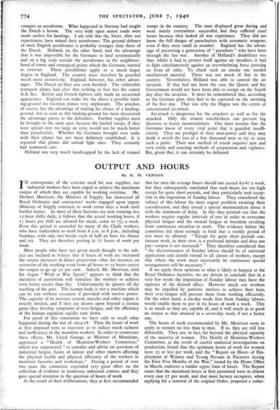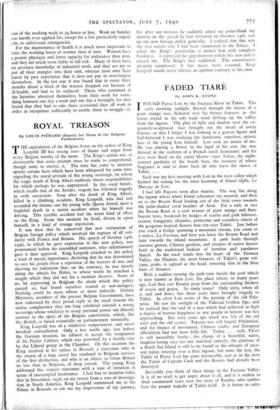OUTPUT AND HOURS
By H. M. VERNON
IN consequence of the extreme need for war supplies, our industrial workers have been urged to achieve the maximum output of which they are capable by working overtime. Mr. Herbert Morrison, the Minister of Supply, has instructed all Royal Ordnance and contractors' works engaged upon urgent Ministry of Supply contracts to work seven days a week until further notice. As most of these factories are now running two rz-hour shifts daily, it follows that the actual working hours, if 1 hours per shift are allowed for meals, come to 731 a week. Even this period is exceeded by many of the Clyde workers, who have undertaken to work from 8 a.m. to 8 p.m., including Sundays, with only two breaks each of half an hour for dinner and tea. They are therefore putting in 77 hours of work per week.
Most people who have not given much thought to the sub- ject are inclined to believe that if hours of work are increased the output increases in direct proportion—that, for instance, an extension of the working week from 48 hours to 72 hours causes the output to go up 5o per cent. Indeed, Mr. Morrison, with his slogan " Work at War Speed," appears to think that the incentive of patriotism will stimulate the workers to achieve even better results than this. Unfortunately he ignores all the teaching of the past. The human body is not a machine which can be run without cessation if provided with motive power. The capacity of its nervous system, muscles and other organs is strictly limited, and if they are drawn upon beyond a certain point they develop symptoms of over-fatigue, and the efficiency of the human organism rapidly runs down.
For proof of this contention we have only to recall what happened during the war of 1914-18. Then the hours of work at first imposed were so excessive as to induce much sickness and inefficiency in the munition workers. In order to counteract these effects, Mr. Lloyd George, as Minister of Munitions, appointed a " Health of Munition-Workers Committee," which was empowered " to consider and advise on questions of industrial fatigue, hours of labour and other matters affecting the physical health and physical efficiency of the workers in munition factories and workshops." During a period of over two years the committee expended very great effort on the collection of evidence in numerous industrial centres, and they gave special attention to the question of hours of work.
As the result of their deliberations, they at first recommended that for men the average hours should not exceed 65-67 a week, but they subsequently concluded that such hours are too high except for quite short periods, and they particularly took excep- tion to the imposition of Sunday labour. They considered the subject of this labour the most urgent problem awaiting their consideration, and they issued a special memorandum about it with the minimum of delay. In this they pointed out that the workers require regular intervals of rest in order to overcome physical fatigue and the mental fatigue or boredom resulting from continuous attention to work. The evidence before the committee led them strongly to hold that a weekly period of rest must be allowed. " Except for quite short periods con- tinuous work, in their view, is a profound mistake and does not pay—output is not increased." They therefore considered that " the discontinuance of Sunday labour should be of universal application and should extend to all classes of workers, except that where the work must necessarily be continuous special arrangements will be necessary."
If we apply these opinions to what is likely to happen at the Royal Ordnance factories, we are driven to conclude that in a very few weeks the imposition of Sunday labour may have the opposite of the desired effect. However much our workers may be impelled by patriotic motives to achieve their best, their over-fatigue will prevent them from working efficiently. On the other hand, a six-day week, free from Sunday labour, would enable them to put in 63 hours of work a week. This is as much as they are capable of, and it will result in as good an output as that attained in a seven-day week, if not a better one.
The hours of work recommended by Mr. Morrison seem to apply to women no less than to men. If so, they are still less defensible. They are, in fact, far beyond the physical capacity of the majority of women. The Health of Munition-Workers Committee, as the result of careful statistical investigations on production, found that the optimum hours of work for women were 55 or less per week, and the Report on Hours of Em- ployment of Women and Young Persons in Factories during the First Five Months of the War," issued by the Home Office in March, endorses a similar upper limit of hours. The Report states that the maximum hours at first permitted were in almost every case 57 per week, and that most factory occupiers, when applying for a renewal of the original Order, proposed a reduc- non of the working week to 54 hours or less. Work on Sunday was hardly ever applied for, except for a few particularly urgent jobs or unforeseen emergencies.
For the maintenance of health it is much more important to limit the working hours of women than of men. Women have a poorer physique and lower capacity for endurance than men, and they are much more liable to fall sick. Many of them have no previous knowledge of industrial work, and they are apt to put all their energies into their task, whereas most men have learnt by past experience that it does not pay to over-fatigue themselves. In the last war it was found that in every three months about a third of the women dropped out because of ill-health, and had to be replaced. Those who remained at the factories absented themselves from their work for some- thing between one day a week and one day a fortnight, for they found that they had to take these occasional days off work in order to recuperate sufficiently to enable them to struggle on.



































 Previous page
Previous page